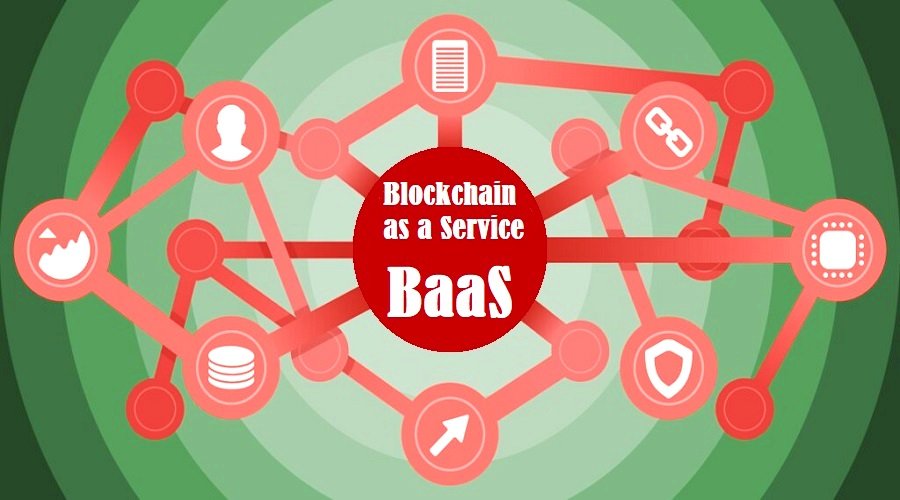Blockchain-as-a-service (BaaS) is a cloud-based service. Let's have a look at the top 5 Blockchain-as-a-service providers that help companies realize their blockchain ambitions.
Blockchain-as-a-Service (BaaS): Overview
Blockchain-as-a-service (BaaS) refers to third-party cloud-based infrastructure and management that allows companies to build, host, and use their own blockchain apps, smart contracts and functions on the blockchain infrastructure. It describes the process of installing, hosting, and maintaining a blockchain network by a third party on behalf of other organizations.
Nowadays, BaaS is used in industries such as financial technology, supply chain, the Internet of Things, and telecommunications, so that companies can access the blockchain without getting their hands dirty.
BaaS gives different companies the opportunity to experiment with blockchain applications and smart contracts while allowing service providers to manage the network itself.
Using BaaS, companies can take advantage of many of the benefits of blockchain technology such as increased transparency and accountability, data security, without having to develop their own blockchain ecosystem or invest in expensive internal computing resources.
Blockchain-as-a-service can be the key to ensuring mainstream adoption of blockchain technology. After all, the functions of BaaS providers are similar to those of web hosting providers. As long as BaaS operators continue to make it easy, fast, and cost-effective for individuals and businesses to implement smart contracts and blockchains, and build influential applications, the blockchain ecosystem will continue to flourish.
5 Largest Blockchain-as-a-Service Enterprises in the World
Let's look at the top 5 BaaS providers that help companies realize their blockchain ambitions.
1. Amazon Web Services
Amazon.com, Inc provides various blockchain tools to companies of all sizes through its cloud computing division, Amazon Web Services.
Amazon Web Services (AWS) provides a high-performance, unchanging Quantum Ledger Database (QLDB), and allows all striped enterprises to use the Amazon Managed Blockchain launched in 2018 to deploy and manage private or public blockchains.
For companies that want to manage their own network, they can even choose to move forward, but they need help with the initial setup (AWS Blockchain Template).
Naturally, Amazon has the resources to support thousands of blockchain applications on a large scale, thus ensuring a stable high-end customer base, such as Nestle, BMW, Accenture, Sony Music Japan, and Singapore Exchange.
2. IBM Blockchain
International Business Machines Corporation (IBM) is one of the most influential companies in the world. With its blockchain platform, IBM allows organizations such as Kroger and Plastic Bank to "easily build and join blockchain networks locally or on any private, public or hybrid multi-cloud."
IBM created the Trust Your Supplier platform with the blockchain company Chainyard (Vodafone is a new customer), and it created the Contingent Labor platform with IT People.
IBM's blockchain-as-a-service business deploys Hyperledger Fabric and has been widely used in industries such as food supply, media, advertising, and trade finance.
3. Microsoft Azure
Azure Blockchain Service is a fully managed ledger service that enables users to develop and operate blockchain networks on a large scale in Azure.
Microsoft Azure Blockchain platform enables customers such as General Electric and T-Mobile to deploy blockchain networks, build applications with confidence, and store data offline.
Users have multiple options to choose multiple networks that Microsoft Azure provides including Azure Blockchain Service, Azure Blockchain Workbench, and Azure Blockchain Development Kit.
Microsoft is particularly keen to eliminate the difference between Azure and AWS, noting that the AWS is 5 times more expensive than Azure for Windows Server and SQL Server and that Azure's compliance products are more comprehensive.
Regardless, Azure's integration with other Microsoft products (such as Logic Apps and Flow) makes it a reliable choice for businesses seeking to leverage blockchain.
2. Alibaba Cloud
Alibaba Cloud BaaS (blockchain-as-a-service) is a company listed in 2018 under the protection of its computing department. Alibaba Cloud platform is the world's largest blockchain patent.
Alibaba Cloud BaaS platform uses Quorum, Hyperledger Fabric and Ant Blockchain to integrate Alibaba Cloud's Internet of Things (IoT) and anti-counterfeiting technologies to create block solutions to achieve product traceability.
Currently, Alibaba's BaaS products include enterprise-level BaaS services, agile BaaS platforms that support intelligent deployment, and specific block solutions for services.
5. Oracle Blockchain Platform
Oracle Blockchain Platform Cloud Service was launched in 2017 and aims to help enterprises "improve trust and provide agility for cross-network transactions" through its enterprise-level pre-assembled platform based on Hyperledger Fabric.
Customers can register on Blockchain Platforms, configure permissioned blockchain networks for private or consortium models, and run smart contracts to update and query the ledger.
Oracle Blockchain Platform is designed to be used with other tools deployed by Oracle, such as tools for identity Management and Remediation Services.
Note: This article is provided by SciTech Society - an Indian-based scientific and technological information network. Read the full article here: Top 5 Blockchain as a Service Enterprises

